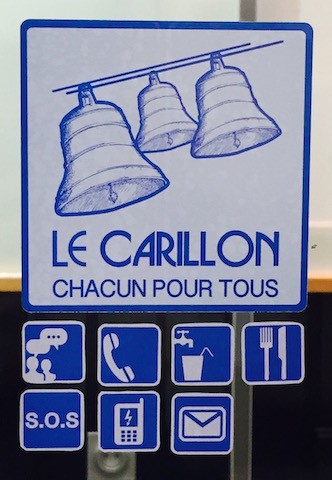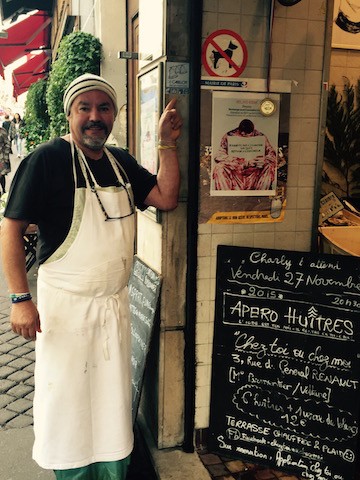The 11th arrondissement’s many homeless residents now know where to get a free meal or use the restroom.

While Parisians have long been sympathetic to their homeless population, a recent pilot initiative in the 11th arrondissement aims to offer more concrete aid. Founded by local resident Louis-Xavier Leca last November, the Le Carillonproject—which coincidentally shares a name with the café that was targeted in the devastating terrorist attacks in the city last fall—has partnered with about 70 small businesses in the area to distribute stickers indicating their support of needy Parisians.

Each sticker features an icon representing a free service, from a hot meal or glass of water to a haircut or restroom access. At the local market Les poireaux de Marguerite, homeless residents can reheat a dish or make an emergency phone call. And at the tea room/coffee shop Chez toi ou chez moi, they can charge cell phones, use a first aid kit, or send mail for free.
In a city with a skyrocketing homeless population, this act of charity couldn’t come at a better time. By connecting local shops to underserved residents, Le Carillon helps to foster a much-needed sense of community. Before Le Carillon officially began in November, Leca says, many shopkeepers wanted to help their homeless neighbors, but didn’t know how to reach out. While certain establishments were already opening their doors to the homeless by offering free coffee or restrooms, homeless residents had no way to distinguish between a place that would accept or reject them.
In the last six months, Le Carillon has been a welcome relief for some homeless residents who may feel embarrassed by the act of soliciting food or basic services. Still, others are reticent to participate. “Because it’s a business, and you have to actually push the door to get in, a lot
Although Le Carillon welcomes people from all walks of life, participating shops have the right to refuse customers who may be under the influence of drugs or alcohol. “If they can’t behave, the shopkeepers will tell them to [leave] and come back later,” Leca says.

For the most part, the relationship between local shops and their homeless neighbors is mutual. In fact, Leca says it’s the paying customers who have been particularly encouraging of homeless clientele. Nearby cities and neighborhoods seem to have taken an interest, as well. Already, Leca has been contacted by more than 100 cities in France alone. By September, he hopes to roll out Le Carillon in five more districts in Paris, five cities in France, and perhaps Belgium and London. After that, he says, the goal is to take the initiative overseas to America.
Until then, Le Carillon can be found where it is needed the most—in a city struggling to overcome the aftermath of a terrible tragedy, all while bridging the divide between its wealthy and less fortunate residents

Excellent blog here! Also your site loads up very fast!
What web host are you using? Can I get your affiliate link to your
host? I wish my website loaded up as fast as yours lol
My sites are hosted on Bluehost.com